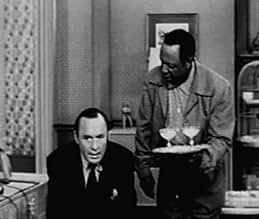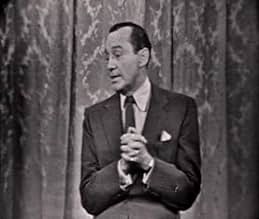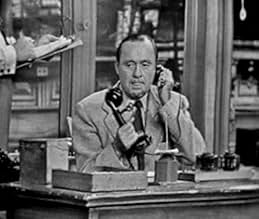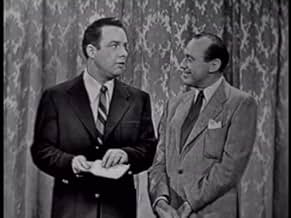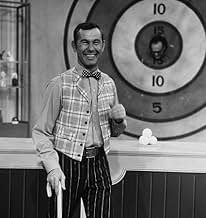CALIFICACIÓN DE IMDb
8.5/10
1.8 k
TU CALIFICACIÓN
Las cómicas desventuras del cómico "tacaño" y sus amigos.Las cómicas desventuras del cómico "tacaño" y sus amigos.Las cómicas desventuras del cómico "tacaño" y sus amigos.
- Ganó 7 premios Primetime Emmy
- 8 premios ganados y 14 nominaciones en total
Explorar episodios
Opiniones destacadas
I just finished watching an hour-long JACK BENNY SHOW from 1965 with perhaps the best guests ever assembled: Bob Hope, Elke Sommer, The Beach Boys (introducing some now very classic songs), and Walt Disney! The first skit was a parody of popular shows of that era (The Munsters, The Addams Family, Bewitched, My Mother the Car, The Fugitive, and Peyton Place), but the best skit was an Italian film style version of Mary Poppins with Elke Sommer in the title role, Bob Hope as a chauffeur, and Jack Benny as the father. There is also a great skit with Benny visiting Disney's office asking for free tickets to Disneyland for 110 guests. Lots of music from the Beach Boys and Elke Sommer (who manages to steal every scene, even up against Hope and Benny!). If you find this at an on-line auction somewhere (that's how I found it) it is well worth the investment. A classic the entire family will love.
This was one of the great comedy shows of all time and one of the TV's Golden age of programs that begin in the early 1950's and continued onward into the mid-1960's. Jack Benny had been a regular network-radio personality since 1932. When he made his first tentative forays into television in 1950,it was mainly a series of specials that aired on a infrequent basis in what would eventually become his regular Sunday night-time slot(that ran from October of 1950,and ending in June of 1962). Ten of them aired during the 1950-1951 season and 1951-1952 seasons. From October 5, 1952,through the following January his show was televised once every four weeks,and when he returned again,on September 13,1953,it was an alternate-week basis that lasted through June of 1960. For his last five seasons,"The Jack Benny Show" aired every week. It was shown on two major television networks. First it ran on CBS-TV from October 28,1950 through September of 1964. Then the show switched networks,this time over to NBC-TV from September of 1964 through September of 1965,which lasted one season.
It amazingly ran for an impressive fifteen seasons on prime-time television. 1950-1965.
The format of the show,and the personality of its star,so well honed in two decades on radio,made the transition television almost intact. Jack's stinginess,vanity about his supposed age of 39,basement vault where he kept all his money,ancient Maxwell automobile,and feigned ineptness at playing the violin were all part of the act-and were,if anything,bolstered by their visibility on the TV show. Added to Jack's famous pregnant pause and exasperated "Well!" were a rather mincing walk,an affected hand to the cheek and a pained look of disbelief when confronted by life's little tragedies. The show also made some headway into the relationship between employer and employee and "The Jack Benny Program" was the only show on television where you could see individuals of different races and backgrounds working with each other. The two regulars that were with Jack throughout his television run were Eddie "Rochester" Anderson,as his valet and Don Wilson as his announcer and friend. Appearing on a more irregular basis were Dennis Day,Artie Auerbach,Frank Nelson,Mary Livingstone(Mrs. Jack Benny),and Mel Blanc,all veterans from the radio show. Blanc,the master of a thousand voices for several cartoon characters(including Bugs Bunny as well the voice of Barney Rubble on "The Flintstones",and Mr. Spacey on "The Jetsons"),was both heard as the engine of Jack's Maxwell and seen as Professor LeBlanc,his long-suffering violin teacher.
Jack's underplayed comedy was as popular on television as it has been on the radio. After fifteen years as more or less regular television performer,he cut back his schedule to an occasional special and continued to appear until his untimely death in 1974. But it wasn't until 12 years after "The Jack Benny Program" went off the air,CBS brought back several episodes of "The Jack Benny Show",originally filmed in the early 1960's,for a limited run in August of 1977. CBS had also aired repeats of this series on weekday afternoons from October of 1964 to September of 1965 as "The Jack Benny Daytime Show",and on Sunday afternoons from October of 1964 to March of 1965 as "Sunday with Jack Benny"
It amazingly ran for an impressive fifteen seasons on prime-time television. 1950-1965.
The format of the show,and the personality of its star,so well honed in two decades on radio,made the transition television almost intact. Jack's stinginess,vanity about his supposed age of 39,basement vault where he kept all his money,ancient Maxwell automobile,and feigned ineptness at playing the violin were all part of the act-and were,if anything,bolstered by their visibility on the TV show. Added to Jack's famous pregnant pause and exasperated "Well!" were a rather mincing walk,an affected hand to the cheek and a pained look of disbelief when confronted by life's little tragedies. The show also made some headway into the relationship between employer and employee and "The Jack Benny Program" was the only show on television where you could see individuals of different races and backgrounds working with each other. The two regulars that were with Jack throughout his television run were Eddie "Rochester" Anderson,as his valet and Don Wilson as his announcer and friend. Appearing on a more irregular basis were Dennis Day,Artie Auerbach,Frank Nelson,Mary Livingstone(Mrs. Jack Benny),and Mel Blanc,all veterans from the radio show. Blanc,the master of a thousand voices for several cartoon characters(including Bugs Bunny as well the voice of Barney Rubble on "The Flintstones",and Mr. Spacey on "The Jetsons"),was both heard as the engine of Jack's Maxwell and seen as Professor LeBlanc,his long-suffering violin teacher.
Jack's underplayed comedy was as popular on television as it has been on the radio. After fifteen years as more or less regular television performer,he cut back his schedule to an occasional special and continued to appear until his untimely death in 1974. But it wasn't until 12 years after "The Jack Benny Program" went off the air,CBS brought back several episodes of "The Jack Benny Show",originally filmed in the early 1960's,for a limited run in August of 1977. CBS had also aired repeats of this series on weekday afternoons from October of 1964 to September of 1965 as "The Jack Benny Daytime Show",and on Sunday afternoons from October of 1964 to March of 1965 as "Sunday with Jack Benny"
I loved The Jack Benny Show. I am so shocked that there were only two comments in your index about it. Yes some of the episodes are almost fifty years old and probably will never see the light of day again, but look at the dreck on tv right now. This show would be just as good as ever. Jack was such a wonderful comic because he always took it so seriously. He didn't even realize how funny he was I don't think. George Burns once said Jack was funniest when he wasn't saying anything. I loved everything about the show and would love to see it again.
In the early 1960's TV Guide critic Cleveland Amory started his review of "The Jack Benny Program" with "There are two kinds of jokes. Regular jokes and Jack Benny jokes." Regular jokes hit you, if you are lucky, only once. Jack Benny jokes hit you, if you are lucky, over and over. What Cleveland Amory at the time was referring to was the way a joke that popped up in the beginning of any given Jack Benny program episode was not an end in itself but a set-up for two, three, or four jokes that would emerge throughout he show.
Some time before I was born, Jack Benny started to use, but never milked, familiar masks: his awful violin playing, his stingy nature, his offense at being insulted by his patented pause followed with, "Well!", his insistence that he was thirty nine years old, and his recurring attempts to get a renowned musician to play his pitiful song, "When the Swallows Come Back to Capistrano".
"Hello, Police Department? I want to report a lost wallet. It is brown leather. Inside there are three one dollar bills. And the serial numbers are......" Inside a sauna: "Gee. I haven't sweated this much since they closed the banks in 1934."
As Jack Benny delighted in telling later in life, sometimes the stories behind the jokes were even more funny than the jokes themselves. Jack would work with the writers in mid-week before any given show. As Jack told it, one week one of the writers thought up the scenario, "Jack is walking down the street and a thug comes up to him with a pistol and demands, 'Your money or your life!'" All readily agreed that that was a good premise for a joke. "But how is Jack going to respond?" All in the room were puzzled and when one writer got impatient by calling out, "Well?", Jack, still stumped for a good punch line, snapped back, "I'm thinking it over!" When the other writers started laughing, Jack asked, "What's so funny?" It took Jack Benny a few moments to get it that he had just invented the best joke of his career.
That Jack will forever be remembered as being forever thirty nine years old is now not a joke but an inspiration for us his fans and survivors to hold on to youth and humor for as long as he did.
Some time before I was born, Jack Benny started to use, but never milked, familiar masks: his awful violin playing, his stingy nature, his offense at being insulted by his patented pause followed with, "Well!", his insistence that he was thirty nine years old, and his recurring attempts to get a renowned musician to play his pitiful song, "When the Swallows Come Back to Capistrano".
"Hello, Police Department? I want to report a lost wallet. It is brown leather. Inside there are three one dollar bills. And the serial numbers are......" Inside a sauna: "Gee. I haven't sweated this much since they closed the banks in 1934."
As Jack Benny delighted in telling later in life, sometimes the stories behind the jokes were even more funny than the jokes themselves. Jack would work with the writers in mid-week before any given show. As Jack told it, one week one of the writers thought up the scenario, "Jack is walking down the street and a thug comes up to him with a pistol and demands, 'Your money or your life!'" All readily agreed that that was a good premise for a joke. "But how is Jack going to respond?" All in the room were puzzled and when one writer got impatient by calling out, "Well?", Jack, still stumped for a good punch line, snapped back, "I'm thinking it over!" When the other writers started laughing, Jack asked, "What's so funny?" It took Jack Benny a few moments to get it that he had just invented the best joke of his career.
That Jack will forever be remembered as being forever thirty nine years old is now not a joke but an inspiration for us his fans and survivors to hold on to youth and humor for as long as he did.
Jack Benny was unique among the great comedians this country has produced. Only his comedy was not the product of gags or situations, though he used them. His comedy arose out of an indelible character he created, the lovable tightwad who came into our homes via radio and television for over 30 years.
In real life Jack Benny was not a tightwad, in fact he was a generous man whose charitable giving was known if not publicized. That of course would have ruined the image and the image was the linchpin of his comedy.
Because we knew his character so well, the cheap gags followed. They would mean nothing to anyone else, but because it was Benny we laughed at a burglar saying your money or your life and Benny stalling with a reply of I'm thinking. The sounds of his Maxwell car were second nature, they brought laughs because Benny was too cheap to buy a new car. And his Social Security number, 000-00-0001 in deference to his age.
The Jack Benny Show took us inside the pretend world of tightwad Jack Benny. His announcer Don Wilson, real life wife Mary Livingston, butler Eddie 'Rochester' Anderson, and the perpetual adolescent with the piping tenor Dennis Day all were part of that world. On radio Phil Harris as the brash band-leader was there, but he didn't make it to television, deciding to strike out on his own. All of these people bounced gags off Benny's tightwad character and all got generous laughs at his expense. But the laughs were coming for Benny's character, not necessarily out of anything he said necessarily.
Some his shows were classics and allowed people to really enjoy themselves. One of my favorites had Raymond Burr as a guest star who did courtroom sketch and broke into a song and dance before the jury. Burr looked like he was having a great time. Another show I remember had long time show business friends Bing Crosby and George Burns as guests, reminiscing about back in the days when the three of them were a vaudeville trio act.
His shows were welcome in millions of American homes including mine. Would that another Jack Benny would come on the scene today.
In real life Jack Benny was not a tightwad, in fact he was a generous man whose charitable giving was known if not publicized. That of course would have ruined the image and the image was the linchpin of his comedy.
Because we knew his character so well, the cheap gags followed. They would mean nothing to anyone else, but because it was Benny we laughed at a burglar saying your money or your life and Benny stalling with a reply of I'm thinking. The sounds of his Maxwell car were second nature, they brought laughs because Benny was too cheap to buy a new car. And his Social Security number, 000-00-0001 in deference to his age.
The Jack Benny Show took us inside the pretend world of tightwad Jack Benny. His announcer Don Wilson, real life wife Mary Livingston, butler Eddie 'Rochester' Anderson, and the perpetual adolescent with the piping tenor Dennis Day all were part of that world. On radio Phil Harris as the brash band-leader was there, but he didn't make it to television, deciding to strike out on his own. All of these people bounced gags off Benny's tightwad character and all got generous laughs at his expense. But the laughs were coming for Benny's character, not necessarily out of anything he said necessarily.
Some his shows were classics and allowed people to really enjoy themselves. One of my favorites had Raymond Burr as a guest star who did courtroom sketch and broke into a song and dance before the jury. Burr looked like he was having a great time. Another show I remember had long time show business friends Bing Crosby and George Burns as guests, reminiscing about back in the days when the three of them were a vaudeville trio act.
His shows were welcome in millions of American homes including mine. Would that another Jack Benny would come on the scene today.
¿Sabías que…?
- TriviaMost of Jack Benny's original radio cast appeared on television with him, including Don Wilson, Eddie 'Rochester' Anderson, Dennis Day, and his real-life wife Mary Livingstone made several guest appearances. In one episode, Jack dreamed that he and Mary (his platonic friend on the show) were married and had a teenage daughter. Their daughter was played by their real daughter, Joan Benny.
- ErroresWhen the show was originally broadcast live, the program introduction was "From Television City in Hollywood..." CBS Television City is in the Fairfax District of Los Angeles, not in Hollywood.
- Citas
Marilyn Monroe: What about the difference in our ages?
Jack: Oh, it's not that big a difference. You're twenty-five and I'm thirty-nine.
Marilyn Monroe: I know, Jack. But what about twenty-five years from now when I'm fifty and you're thirty-nine?
Jack: Gee, I never thought of that.
- ConexionesFeatured in Depth Study (1957)
Selecciones populares
Inicia sesión para calificar y agrega a la lista de videos para obtener recomendaciones personalizadas
- How many seasons does The Jack Benny Program have?Con tecnología de Alexa
Detalles
- Fecha de lanzamiento
- País de origen
- Idioma
- También se conoce como
- The Jack Benny Show
- Locaciones de filmación
- Productoras
- Ver más créditos de la compañía en IMDbPro
- Tiempo de ejecución
- 30min
- Color
- Mezcla de sonido
- Relación de aspecto
- 1.33 : 1
Contribuir a esta página
Sugiere una edición o agrega el contenido que falta


